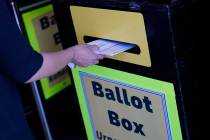NRA lobbyist Dan Reid on background checks, red flag laws, lawsuits
The background check bill currently being rushed through the Nevada legislature isn’t the same as the background check initiative voters passed in 2016. The bill also has a weaker exemption for hunters than a similar law in California. That’s according to Dan Reid, western director of the National Rifle Association, who said the NRA is also considering a legal challenge.
The Nevada Legislature is currently considering SB143, which would mandate background checks on private-party firearm sales and transfers. In 2016, voters narrowly approved a similar initiative, but it never took effect after the FBI refused to do the background checks.
“This isn’t what the voters passed,” Reid said while filming Nevada Politics Today. “Question 1 had significant flaws, which was how the background check was to be processed.
“It was pushed as being a free federal system and this is different. Nevada taxpayers are going to have to pick up the tab on this one.”
Along with the extra cost, Reid doesn’t believe expanded background checks will do anything to reduce crime.
“There was just a recent study out of California,” Reid said. “California has had expanded background checks for decades. The UC Davis Center along with John Hopkins studied this.
They put control measures in there to study this. And they said that expanded background checks on private transfers as well as expanding prohibitors to misdemeanor crimes had no effect on violent crimes or suicides. This was a peer-reviewed study. This wasn’t a study that was cherry-picking dates, times, states for convenience.
Reid said the reason expanded background checks don’t reduce crime is that most criminals don’t try to purchase firearms legally.
“They’re getting them through the black market, through theft,” Reid said. “Or they’re getting it from someone off the streets. There’s just a number of ways that they’re going to circumvent the system.”
Reid also objected to the limited and unclear exemptions in the bill
“A lot of these exemptions, the terms are just poorly defined,” he said. “That’s throughout the bill, including the word ‘transfer.’ The very heart of this bill is not defined anywhere. The proponents were asked about that. They admitted that it’s not defined in the bill, but basically anytime you’re relinquishing possession of a firearm you’re going to be required to go to a dealer to perform a check unless you meet one of these enumerated exemptions.
“The hunting exemption is almost unworkable unless you’re going to be traveling with the person that is hunting, because it requires that you possess the firearm in all areas where it’s illegal to hunt. That makes public roads, perhaps if you have to go through an area that’s closed to hunting, that makes you in violation of the exemption or you’re not going to fall within the exemption, which is problematic.
“As I also pointed out in testimony this is stricter than California’s laws when it comes to hunting exemptions. California, with their expanded background checks, allows for someone to loan a firearm for hunting for the duration of the hunting season.”
Asked if the NRA would challenge the constitutionality of changing the bill before its three-year anniversary, which isn’t allowed under the Nevada constitution, Reid said, “I wouldn’t rule out any legal challenges at this time.”
Another gun bill the NRA is concerned about is red-flag legislation. Those types of bills allow a court to remove someone’s firearms if they are found to poise a threat.
“The biggest issue with all these bills is due process,” Reid said. “A person is going to lose their rights based on a third-party allegation. They’ve never been convicted of a crime. They’ve never been adjudicated mentally ill. That’s not how our system of justice should work.”























